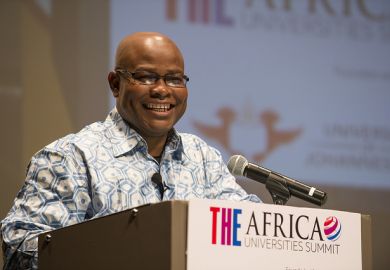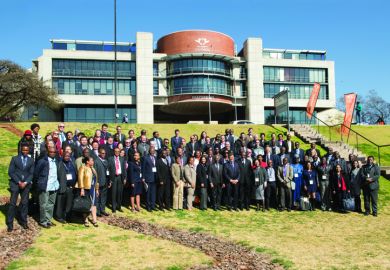Western universities’ partnerships with African higher education institutions often amount to little more than “visits” and fail to develop the continent’s research capacity, a government minister has claimed.
Naledi Pandor, South Africa’s science and technology minister, told the World Conference on Research Integrity that Africans still tended to be “subjects rather than participants” when it came to research and innovation.
“We believe this condition has to alter fundamentally,” she told delegates at Vrije Universiteit Amsterdam. “Many of [those present] have partnerships with colleagues on the African continent.
“I would presume that it would probably be with colleagues in South Africa, perhaps a few in Nigeria and Kenya, meaning that in the sum total of 54 African countries, there are very few relationships with the African continent.”
The partnerships that did exist tended to be of poor quality, continued Ms Pandor, a former lecturer at the University of Cape Town. She reproved the scientific community for talking of promoting integrity – the conference explored the themes of “transparency and accountability” – but not constructing meaningful science relationships with Africa.
“What is the integrity of the absence of scientific participation at its fullest level?” Ms Pandor asked. “It’s been rare for me to observe partnerships between ourselves and international collaborators that result in the presence of a permanent, dedicated scientific institution that will produce world-class research from the African continent. We tend to have partnerships of visits…not partnerships of building permanent capacity.
“As we deliberate on the question of research integrity, and the ethics that we must bring to the work that we do as researchers, we should also begin to question the integrity of the absence of scientific development in a large part of the world that is the subject of a lot of the work that we do.”
Ms Pandor added that the way research was funded was changing dramatically and had in many ways, she said, become the “pet science projects” of billionaires in the developed world. In South Africa, however, it was still a public endeavour, she said.
“I am talking here about billionaires who have a science agenda. Billionaires who appear to be privatising science,” Ms Pandor said. “We’ve observed that it has become fashionable for US billionaires to fund their own pet science projects. We’ve also had South African billionaires taking an interest in science, [but] they’ve not come anywhere close to setting our national science agenda.
“This is because, as a government, South Africa still funds public research institutes. Unlike some of our more developed partner countries, we’ve not scaled down the relative importance of public research institutes in our national innovation system.”
POSTSCRIPT:
Print headline: African higher education: problematic partnerships and pet science projects
Register to continue
Why register?
- Registration is free and only takes a moment
- Once registered, you can read 3 articles a month
- Sign up for our newsletter
Subscribe
Or subscribe for unlimited access to:
- Unlimited access to news, views, insights & reviews
- Digital editions
- Digital access to THE’s university and college rankings analysis
Already registered or a current subscriber?








